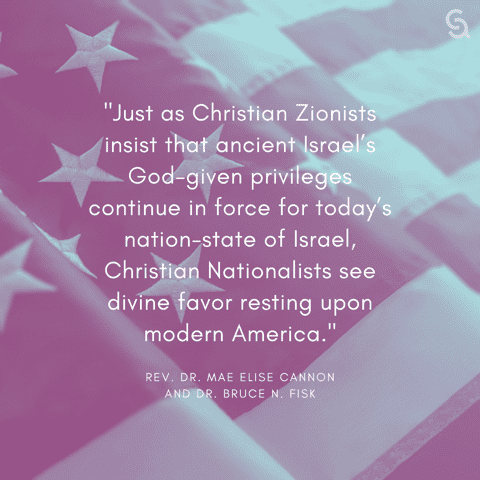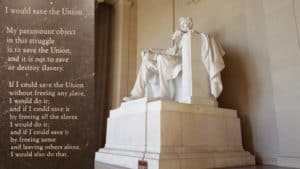 Sparked by the January 6 insurrection at the US Capitol, American evangelicals have been busy debriefing, lamenting, and publicly condemning the scourge of Christian Nationalism. Largely absent from this discussion, however, has been public consideration of any affinity between Christian Nationalists and their more familiar, if less populous, “cousins”—Christian Zionists. As it turns out, the similarities are neither superficial nor coincidental and, as Trump’s circle of Christian lieutenants and advisors made clear, the two ideologies are eminently compatible.
Sparked by the January 6 insurrection at the US Capitol, American evangelicals have been busy debriefing, lamenting, and publicly condemning the scourge of Christian Nationalism. Largely absent from this discussion, however, has been public consideration of any affinity between Christian Nationalists and their more familiar, if less populous, “cousins”—Christian Zionists. As it turns out, the similarities are neither superficial nor coincidental and, as Trump’s circle of Christian lieutenants and advisors made clear, the two ideologies are eminently compatible.
Both Christian Nationalists and Christian Zionists espouse an ideology of exceptionalism.
Christian Nationalists contend that America has always been, and must remain, distinctively Christian. Christian Zionists likewise contend that the Holy Land has always been, and must remain, distinctively Jewish. For both groups, when it comes to narrating history, selecting sacred symbols, elevating cherished values, or determining public policy, the perspectives of American Christians and Israeli Jews must be privileged.
The two movements likewise share an apocalyptic outlook. For Christian Zionists, the restoration of the Jewish people to their historic homeland is a prerequisite for the second coming of Christ. As for Christian Nationalists, those of postmillennial (or Dominionist) persuasion think that, since God’s kingdom has arrived, we must subject all aspects of American civic life to Christ’s dominion. Premillennial Christian Nationalists, meanwhile, are less sanguine about the present age. Expecting to see steady moral decline until Jesus returns, their job is to stem the tide, align America with God’s agenda, and proclaim the gospel before time runs out.
Christian Nationalism and Christian Zionism would both seem to be defensive maneuvers. Shifting demographics in the U.S. are making America’s “greatness” (imagined as Christian, patriarchal, heteronormative, conservative, and white) ever more elusive, a problem Christian Nationalists desperately seek to rectify. Likewise, for Christian Zionists in an increasingly secular world, the modern rebirth of Israel, heralded as the miraculous fulfillment of biblical prophecy, works as an apologetic rebuff to skeptics and decisive proof that the God of the Bible, their God, is on the move in our day.
Just as Christian Zionists insist that ancient Israel’s God-given privileges continue in force for today’s nation-state of Israel, Christian Nationalists see divine favor resting upon modern America. The dark corollary, for those who deem Christian Americans or Jewish Israelis exceptional, is that other groups, say, Muslim Americans or Palestinians in the West Bank and Gaza, are outsiders whose claims and traditions merit little moral consideration. Exceptionalists inhabit binary, exclusionary worlds: Christians in America have God on their side. So do Jews in Israel.
Neither Christian Nationalism nor Christian Zionism is monolithic, of course, nor are they static, and the overlap of constituencies is far from total. But the parallels are real, the movements’ histories are intertwined,[1] and the two are mutually reinforcing as when, for example, a Nationalist believes that America’s success requires support for “God’s people.”[2]
Are these parallels instructive? Might they equip us to show more clearly why exceptionalism, exclusivism and apocalyptic militancy create a toxic narrative in which history is forever a battlefield and “the other” is forever “the enemy”? Might a critique of Christian Nationalism’s myth of America’s chosenness shed light upon Christian Zionism’s idealization of the modern ethnostate of Israel? And vice versa?
What seems clear is that neither movement provides a foundation for reconciliation or peacebuilding between peoples. In today’s polarized American society, divided by class and color, Christian Nationalism works to maintain white supremacy. Zionist ideology (Christian or otherwise) likewise perpetuates not only an ethnic divide between Jews and Palestinians but also a social and legal hierarchy, one that obstructs every quest for a just and enduring peace. The binary thinking these two movements share—in which everyone is either Insider or Intruder, Family or Foreigner, with God or against God—is not just lazy and divisive. It is dangerous.
Rev. Dr. Mae Elise Cannon is the Executive Director of Churches for Middle East Peace (CMEP) and editor of “A Land Full of God: Christian Perspectives on the Holy Land.” Dr. Bruce Fisk is Senior Research Fellow for the Network of Evangelicals for the Middle East (NEME).
[1] See Anatol Lieven, America Right or Wrong: An Anatomy of American Nationalism 2nd ed. (Oxford, 2012) and Amy Kaplan, Our American Israel: The Story of an Entangled Alliance (Harvard, 2018).
[2] Whitehead, Andrew, and Samuel Perry, Taking America Back for God: Christian Nationalism in the United States (Oxford, 2020), 38.


